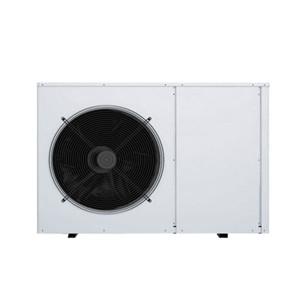Description
What is a hybrid heat pump?
A hybrid heat pump is a heating system that combines an air source heat pump with a gas or oil boiler. Oil or gas boilers are used to "supplement" low temperature heat pumps to meet the heating needs of properties that heat pumps cannot do alone. Depending on efficiency or energy cost goals, specially designed hybrid systems can be set up to control which heat source is activated when.
How does it work?
Most air source heat pumps operate at a lower temperature than our gas or oil heating systems; typically 40-45 degrees Celsius compared to 65-75 degrees Celsius for fossil fuel systems.
Low temperature air source heat pumps are not suitable for existing properties without insulating our homes or expanding our radiators to run cooler temperatures. Some manufacturers make heat pumps that can operate at higher temperatures of 65 degrees Celsius, but with reduced efficiency. There are many horror stories about heat pumps that were wrongly installed in older homes and failed to heat the home and/or significantly increased electricity bills. .
Hybrid heat pumps keep the heat pump running at a happy and efficient 40 degrees Celsius, which will provide plenty of heat for most of the year. As the outside temperature drops, a gas or oil boiler can step in to raise the water temperature when hot water is used.
Numerous hybrid heat pump trials have been conducted in existing homes to better understand the contribution of heat pumps to heating systems. Results varied widely, with which heat pumps provided 50% to 80% of the heating and hot water supply in a sample of house types*.
Hybrid v bivalent system
Hybrid systems are specially made by the same manufacturer as a combined heat pump with an oil or gas boiler. In this setup, the heat pump can run all or most of the time while the gas or oil boiler tops it off.
A bivalent system is any heat pump paired with any gas or oil boiler and combined through a buffer tank. This means you can use your existing gas or oil boiler if it is still in good condition. In this setup, the heat pump will run as much as it can for your needs. When the outside temperature drops below a certain point, the heat pump will shut off and the oil-fired boiler will fire. i.e. they don't run at the same time.
Why do we need a hybrid heat pump?
We have a legal obligation to achieve net zero emissions. With households accounting for 20 percent of greenhouse gas emissions, finding ways to reduce reliance on fossil fuels is important. Home insulation will make up most of the work needed to make this happen, and to reduce our heat needs, we've prepared homes for low temperature air source heat pumps.
However, for poorly insulated and larger homes, fossil fuels may still have to pay in the medium term to provide the higher temperatures required by traditional radiator systems.
The Climate Change Council (CCC) identified hybrid heat pumps as an important and fast way to reduce our consumption of fossil fuels and start decarbonizing homes.
What are the benefits for the average family?
For the average home, a hybrid system offers an opportunity to reduce our gas or oil consumption without waiting for our home to be insulated or to replace all our radiators. For off-grid homes, they can also lower your running costs. For those using main gas, if the heat pump is set to run efficiently, the running costs will be similar to main gas (depending on electricity bills).
Hybrid Heat Pump Manufacturer
Homeowners have several options for combining a heat pump with a fossil fuel boiler, and in some cases, they can keep their existing boiler in place. Alternatively, any heat pump and gas or oil boiler can be combined via a buffer tank.
600i AW
Meet demanding hot water needs - from small to large homes.
650i AW
Our premium heat pumps are our quietest for small to mid-sized homes.
Hybrid
Combine a gas combination boiler with a heat pump in the wider home.
Financial support
Hybrid heat pumps are eligible for the Renewable Heat Incentive Payback program, but installations need to be metered in order to pay for the renewable energy you generate.
Need more help?
Contact us if you are considering renewable technology for your home. We can provide professional help.






